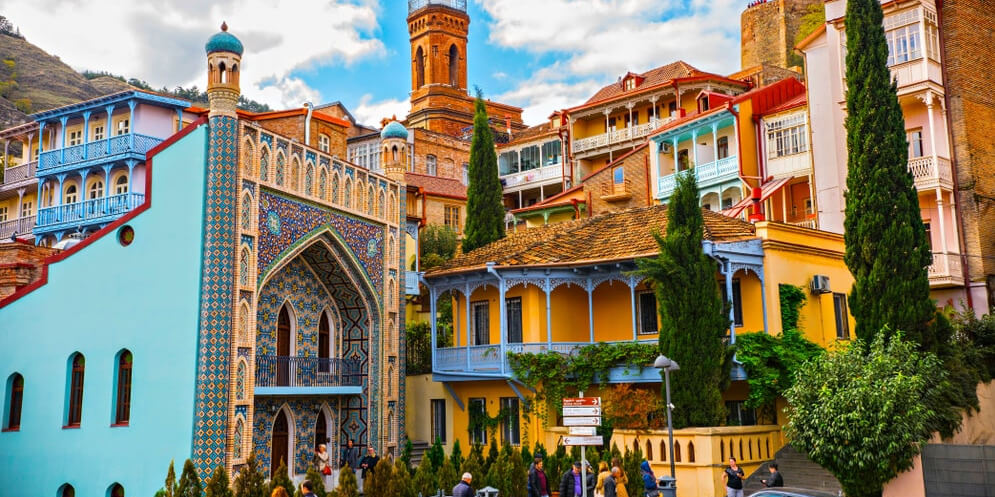Middle East investors wake up to Georgia to recover from pandemic losses
From student housing and hotels to residential and commercial projects, investors from across the Middle East are pumping millions of dollars into real estate across Georgia.
Georgia’s ease of doing business, along with its low costs, high returns, flexible visa rules and scenic landscapes, has caught the eyes of investors looking to recover from pandemic losses.
“In Georgia, you can open a bank account, register a company and rent a house all in one day,” Islam Shalaby, creative director at Tbilisi-based real estate developer Swef Land, told Salaam Gateway.
“Freehold is possible for foreigners except for agricultural land, so you can fully own real estate without having residency, you can run a business, and you will pay taxes just like locals,” he said.
Citizens of 98 countries, including all six Gulf Cooperation Council (GCC) countries, can live, work and study in Georgia without the need for a visa or residence permit.
“Residents of most of those countries can also stay in the country for 90 days. They’ve recently started to become more stringent to control the number of immigrants as Georgia is preparing to apply for European Union (EU) membership in 2024,” said Shalaby.
High returns
Today, three of the largest real estate development companies in Georgia are owned by Egyptians: York Towers, Swef Land, and OTI Real Estate.
All three companies began as intermediaries before venturing into development. Together, they have pulled in millions of dollars in investments from the Middle East and beyond.
“They studied and tested the market and gradually, backed by strong investors, they started investing millions and acquiring land,” said Shalaby.
He said that real estate investors in Georgia get 8% to 12% annual return on investment (ROI).
“Even at the peak of the pandemic, it was the safest and most promising sector, and investments increased,” said Shalaby.
OTI, for instance, entered the student housing market in 2020. Led by CEO Hani Hebashi, who is also the president of the Georgian-Egyptian Business Council, the company’s $160 million project comprises five residential complexes across Batumi and Tbilisi, Georgia’s two largest cities
According to Hebashi, Georgia has around 12,000 foreign students but lacks student accommodation in line with international standards.
He said that student housing is among the top five most attractive sectors for investment worldwide, with an annual ROI of 4.5% to 7%, but in Georgia, OTI is offering up to 10%.
Read: Middle East tourist arrivals in Georgia soar 511% year-on-year
Resilient sector
Georgia’s real estate market was not severely affected by the pandemic. In 2020, for example, Swef Land injected $200 million into Georgia by bringing foreign capital into the country.
Meanwhile, OTI Real Estate has brought $500 million to Georgia since 2018 through more than 500 investors, mostly Arabs. The company recently partnered with Kuwait’s Ayar Real Estate to develop tourism resorts and residential projects.
York Towers also made its biggest investment in 2020, acquiring 2 million square metres of strategic land around the Bazaleti Lake, northwest of the capital.
“To invest in such a huge commercial plot, ready with infrastructure, and bring in Arab investors in the middle of the pandemic is a major achievement,” said Shalaby.
Georgia’s GDP is expected to grow by 8.5% in 2021 after an economic contraction of 6.2% in 2020, according to the Asian Development Bank.
“Very few countries recovered this fast and to higher levels than pre-pandemic. As soon as the country opened, there was a huge pent-up demand for travel; people were rushing to visit,” said Shalaby, who works with multiple companies in Georgia.
“Business owners were eager to make up for financial losses and were looking for good opportunities. So, 2021 was a great year for many people and a fortunate time for business,” he said.
Swef Land is holding its first conference, Invest Hub, on 28 December to promote its latest projects, including the new ‘Hollywood Resort’.
The massive development lies in a green valley between two mountains and is surrounded by 44 cultural and archaeological landmarks. It will have a cinematic theme and the country’s longest zipline.
With the market’s recent performance, institutional investors from the Middle East are waking up to Georgia’s potential. But the trend is not entirely new.
One of the first investments from the region came from the UAE-based Ras Al Khaimah Investment Authority, which acquired Sheraton Grand Tbilisi Metechi Palace in 2007 for $68 million.
A decade later, the UAE’s now-dissolved Dhabi Group invested $130 million in Biltmore Tbilisi Hotel, which occupies a historical building in the ancient city.
Natural landscapes
While the UAE remains the largest government investor in Georgia among Arab countries, Saudi Arabia accounts for the lion’s share of individual investments, according to Shalaby.
“Saudis are investing in private real estate, including land, apartments, and villas – often multiple properties – in both cities and suburbs; the latter has a higher ROI,” he said.
A large part of Swef Land’s work is focused on the suburbs. The company believes these areas will eventually transform into major population centres due to urban expansion, and therefore, their value will increase.
“Swef Land managed to sell seven projects in one year because it focuses on suburbs. It doesn’t make sense to bring a GCC investor and tell him to invest in a building just like the one in Riyadh, for example. They want to see the beauty of Georgia’s nature,” said Shalaby.
© SalaamGateway.com 2021 All Rights Reserved
